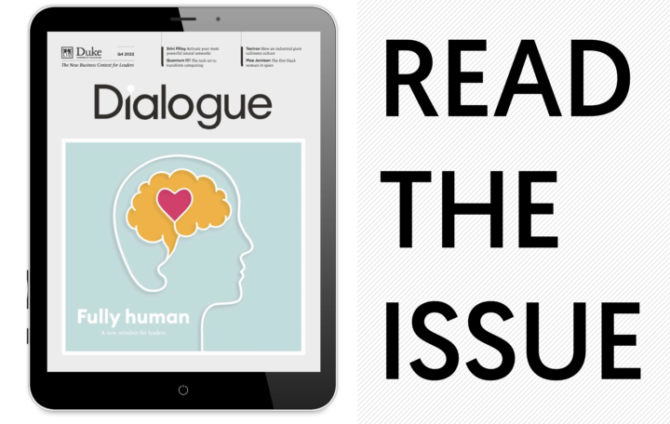The latest issue of Dialogue considers the new leadership mentality: to be a whole human
Leaders are confronted by increasing numbers of complex, seemingly intractable problems. The frailties of many of our global systems are becoming more apparent. The pandemic ruthlessly exposed economic vulnerabilities when it brought parts of the global economy juddering to a halt – and we’re still living with the aftershocks. There are growing concerns about the frailty of food supply chains in the face of geopolitical tensions, war and climate change.
How successfully the world responds to these challenges will, in part, be determined by commercial organizations. As Duke CE’s chief executive Sharmla Chetty points out in her column, enlightened business self-interest can create virtuous cycles that deliver social and environmental benefits. The role of business in a world shaped by ESG will be our focus in the next issue of Dialogue – but in this issue, we dive down to the individual, personal level.
A discussion about personal capabilities and the contribution made by individuals at work may seem rather far removed from the systemic, global challenges in front of us. But that would overlook the potential that is in realizing a more fully human way of leading. After all, organizations are, at heart, the sum of the endeavours of the people who work in them. They need our full creativity, resourcefulness and adaptability. If our organizations are to thrive in the face of the global challenges facing humanity, we will need to bring them our full humanity.
The question, then, is how to cultivate a fully human way of leading. For answers, start with Srini Pillay, who explains that the classic processes of managing an organization tend to activate only a narrow slice of our brains. Many of our most powerful neural networks are left dormant or underutilized. Learning how to tap into their potential is crucial if we want to imagine a different future and build solutions to today’s problems. André Martin considers the much-misunderstood role of inspiration and how it can help us convert creative ideas into world-changing actions. Rasmus Hougaard and Moses Mohan consider another aspect of how we deploy our full humanity at work – through compassion and wisdom – and explain the four skills needed to bring those qualities to life. Justin Bariso examines the importance of another quintessentially human ability, empathy – and explains why leaders should beware its dark side. L Gregory Jones reflects on the importance of curiosity and humility for navigating and reconciling our differences in a fractious world. With the right leadership, a diversity of viewpoints is a source of strength – a point that Michael Canning also makes after an inspiring conversation about life and leadership with Bruce Crawford of Jacobs.
Elsewhere, Amanda Nimon-Peters sets out nine science-based principles for influencing others and – ethically – getting results. Terence Tse provides a primer on quantum computing and its potential impact on business, while Perry Carpenter explains why people, not technology, are the biggest factor in cybersecurity.
And we share insights from three fascinating leader interviews. Adel Al-Majed reflects on his role at the top of Kuwait-based Boubyan Bank. Julie Duffy of industrial conglomerate Textron tells us how people and culture are integral to her company’s ongoing success, 99 years on from its creation. And Mae Jemison, former astronaut and a lifelong champion of improved educational opportunities, shares inspirational lessons from her incredible career.
Enjoy the issue.

